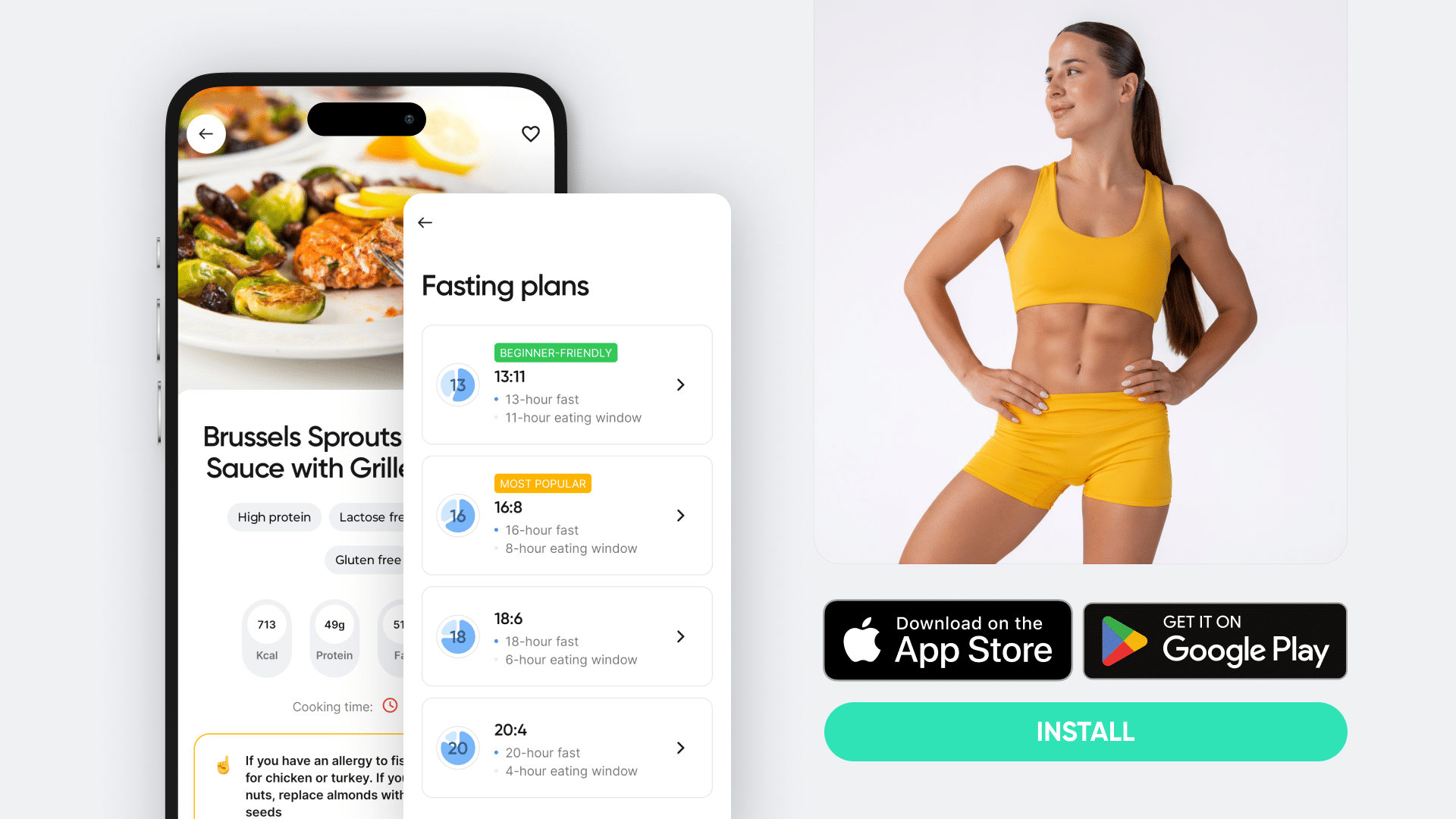Intermittent fasting (IF) is a hot topic for weight loss and fitness. Proponents hail it as a powerful tool for calorie restriction and weight management. But, is IF truly effective, or could it be detrimental to long-term health?
The debates around “Is fasting bad?” date back decades. Researchers are divided into various camps, which makes it quite confusing for people looking to hit their fitness goals with a fasting routine. Let’s explore some basics of intermittent fasting in this article and ways to make a flawless fasting plan!
Can Fasting be Harmful?
Fasting, like other weight loss routines, needs to be properly monitored. When you fast, you begin to deplete your body of essential nutrients and food, as you restrict your caloric intake. If you follow an intermittent fasting plan and consume healthy balanced meals during your eating windows, you may experience the benefits of fasting for weight loss.
However, fasting may also pose the following risks:
Hunger
When you first start fasting, you may experience bouts of hunger and cravings. This may cause you to binge-eat or overeat after your fast window, leading to weight gain. This is at least partly due to your body releasing the hormone ghrelin, or the hunger hormone, which influences hunger.
Higher levels of ghrelin may cause you to overeat (9). This can also cause you to be preoccupied with food, making it difficult to focus on other things and affecting your productivity, mood, and other aspects of your life.
Fatigue and Headaches
If you are not used to fasting, you may experience fatigue, irritability, and mood changes initially. Skipping meals may trigger migraine headaches, which can be debilitating for some.
May affect certain health conditions or medication use
Severely restricting the diet and/or abstaining from food may be harmful to individuals with certain health conditions, such as diabetes, kidney disease, or heart disease. Individuals who take medication for blood pressure should be cautious about fasting, as it impacts the sodium and potassium levels in the blood. Also, fasting may be problematic for individuals who need to take medication with food to avoid nausea or other side effects (1). Always talk to your healthcare provider before attempting a fast.
Eating Disorders
Individuals with a history of or at risk for eating disorders should avoid fasting, as it has a strong association with bulimia nervosa and other eating disorders(13). A 2022 study found that intermittent fasting was linked to disordered eating behaviors among young adults (10.
Digestive Issues
Restricting your diet and reducing the amount of food you consume may cause digestive issues, such as nausea or indigestion for some people (3). Changing your diet significantly during fasting can also impact your stomach and may cause intermittent fasting bloating for some people.
Dehydration
During fasting, the body can get depleted of fluids and electrolytes. In the initial days of fasting, the body releases large amounts of water and salt in the urine, and if you don’t drink enough water or replenish electrolytes, you may be at risk of dehydration (6).
Also, you may forget to drink enough water when you begin fasting, so it is important to stay hydrated and drink adequate water, even during your fasting periods. Another way to check whether your body is dehydrated is through visually examining your urine. Your urine should be a pale yellow color. If it is dark, it’s a sign that you may be dehydrated.
Intense sweat sessions, working weight loss tips, lip-smacking recipes come in one package with the BetterMe app. And all of it is at your fingertips, start transforming your life now!
Malnutrition
Similarly, if you don’t plan your fasting plan, you may be at risk of malnutrition. It is important to consume all of the essential nutrients after you break your fast to replenish your body (3). Some individuals make the mistake of cutting down on calories too severely and abstaining from having proper meals in the hope of losing excessive weight.
In fact, doing this can make fasting unhelpful for weight loss, as the body can go into energy conservation mode and slow down metabolism, preventing weight loss. Additionally, rapid weight loss can be harmful and lead to health complications in the long run.
How Long Is It Safe to Fast?
Fasting, like other diet routines, must be followed safely and should include a set eating or fasting window. If you are new to fasting, your body may not be used to keeping up with a lack of food. With that in mind, it is important to start slow.
Generally, short-term fasting, or intermittent fasting, is considered safe for most beginners who are adults, are not pregnant or breastfeeding, and have no medical conditions. Fasting for 12 hours is a good place to start. You can work your way up to longer fasting periods as tolerated, as long as you and your healthcare provider determine that it is safe for you. (14).
More advanced fasters may fast for up to 24 hours at a time, but longer fasts usually require medical supervision.
Is Fasting Good For Our Body?
Some evidence, mostly from research in animals, suggests that fasting might offer some of the following health benefits, however, more long-term research in humans is needed:
Promotes Better Blood Sugar Control
Fasting might be beneficial for individuals at the risk of developing diabetes by improving blood sugar control and reducing insulin resistance. One 2023 study found that intermittent fasting improved glucose metabolism more than daily calorie restriction in people at risk for type 2 diabetes (11).
Fasting may reduce insulin resistance, allowing your body to transport glucose into your cells efficiently. This helps keep your blood sugar within a healthy range..
Might Improve Heart Health
Regular fasting might also be beneficial to your heart health. Some researchers have observed improvements in heart health markers along with weight loss, although not all studies agree.. For example, one meta-analysis found that alternate-day fasting reduced total cholesterol along with BMI, body weight, and body fat mass (7). Other studies have also suggested that alternate-day and whole-day fasting regimens may reduce total cholesterol and triglycerides (8).
Aids in Weight Loss
The biggest benefit of fasting is weight loss, and this is the reason why individuals fast in the first place. A 2015 review of studies found that alternate day fasting and whole-day fasting seem to be effective at reducing body weight and body fat (8).
Enhances Cognitive Function
Some people find that fasting helps enhance cognitive function. One possible reason is that fasting may increase the production of BDNF, or brain-derived neurotrophic factor, a brain protein. BDNF activates brain stem cells to form new neurons. Additionally, BDNF may protect brain cells and help prevent Alzheimer’s and Parkinson’s disease (2).
Is It Safe to Fast For 3 Days?
Fasting for 3 days consecutively, or water fasting, is a type of restrictive fasting whereby individuals consume only water for 72 hours. The process involves severely limiting calories by relying on water only. Water fasting has become pretty popular recently, due to the idea that prolonged fasting might stimulate autophagy (15).
However, the risks of water fasting far outweigh the benefits, as relying on water only for extended hours is potentially harmful to health and must be done cautiously. Some individuals may experience dizziness and weakness during water fasting, or other dangerous effects.
Here are some risks of fasting for 3 days:
- The biggest risk is dehydration, as 20-30% of your daily water intake and most of your electrolytes come from the foods you eat daily. If you are only consuming water and not eating solid foods, you might not get enough water or electrolytes, and you may risk dehydration. As a result, you may experience nausea, headaches, constipation, low blood pressure, or lethargy. Electrolyte imbalances can also happen and may be life-threatening if severe.
- Secondly, dehydration due to water fasting may lead to orthostatic hypotension, a sudden drop in blood pressure when you stand up quickly, making you dizzy or lightheaded and at risk of fainting (5).
- Lastly, individuals with certain health conditions should not do water fasting. For example, it increases uric acid production, leading to gout attacks (6). It can cause dangerously low blood sugar levels in people with diabetes or taking blood sugar medications. It might also affect blood pressure similarly. It may also trigger disordered eating behaviors in individuals with a history of or at risk for eating disorders.
In a nutshell, fasting for 3 days is generally unsafe and may put you at risk for several health problems. You should avoid fasting for extended periods and seek advice from a medical professional before curating any plans for yourself.
Read more: Your Flat Tummy Workouts Just Got Better With This Guide
Who Should Avoid Fasting?
Is fasting bad? Well, for some, fasting could be a dangerous pursuit. It may seem like the perfect solution to lose excessive weight, but some individuals should steer clear of it. These people include those who have (4).
Diabetes
Individuals with diabetes already go through a lot, and with fasting, the risk of blood glucose levels dropping dangerously low is significant. Many people with diabetes take insulin or other medications to lower their blood sugar levels, and fasting without close monitoring and making adjustments to these medications can be very dangerous. Therefore, you should only fast under medical supervision and consume a proper diet to maintain your blood sugar levels.
Pregnancy
If you are pregnant or breastfeeding, you must avoid fasting as it can severely affect your and your child’s health. Pregnancy requires constant nutrition for fetal development and lactation requires calories for milk production. Restricting caloric intake may also disrupt your fertility, as fasting may cause changes in the menstrual cycle and hormone production.
Sleep Problems
Sleep is crucial to health, and having adequate sleep daily burns calories and helps you maintain a healthy weight. Fasting and going to bed hungry may interfere with your body’s ability to fall asleep or relax, as hunger makes your brain alert and your body restless. During fasting, your blood sugar levels decline, and if you go to bed hungry, you may suddenly wake up in the middle of the night feeling anxious.
Also, having little sleep may interfere with your weight loss goals and affect your cognitive function. So, if you have sleep problems or have trouble falling asleep, you should avoid fasting.
Eating Disorders
If you have a history of eating disorders, such as bulimia nervosa or anorexia nervosa, you must avoid fasting. This is because fasting may trigger irregular eating patterns and disordered eating. Therefore, you should avoid intermittent fasting if you have or are at risk for these conditions.
Strength Training
If you are trying to build muscles or training for a marathon, you may avoid intermittent fasting. This is because your body requires nutrients and protein to build muscle, which you get from pre-workout and post-workout meals. Also, when you do intense training, your muscles get depleted of glycogen and experience slight tears, which require nutrients to replace glycogen stores and rebuild muscle.
Also, if you are trying to build muscle mass, you may need to consume protein at different times throughout the day, to maximize available amino acids for muscle synthesis
Digestive Issues
Intermittent fasting or irregular eating may exacerbate digestive distress already experienced by those with digestive problems. Periods of fasting can disrupt the normal activities of the digestive system, causing constipation, indigestion, and bloating.
Lack of Focus
When you are fasting, you can feel hungry, which interferes with your mind’s ability to focus. Hunger impedes concentration, so you should avoid fasting if you have a job that requires dedication and concentration. Fasting can cause fatigue, low energy, and reduced concentration, hindering your productivity and preventing you from working or studying at full concentration.
Medication
If you are on medication that must be taken with food, you must avoid fasting, as taking it without food may make you feel lightheaded or nauseated. For example, if you are anemic and take iron supplements daily, you should avoid fasting, as iron supplements must be taken with food to reduce their nauseating side effects. Similarly, there are certain medications that must be taken with food in order to be absorbed properly. Additionally, fasting while on medications that lower blood sugar or blood pressure can be dangerous.
Compromised Immunity
If you are undergoing treatment for a serious disease or have just recovered from one, you shouldn’t participate in fasting without first consulting with your physician. In most cases, adequate caloric intake is needed to maintain lean body mass and a healthy immune system, which is necessary for individuals with cancer or weakened immune systems. Fasting with a compromised immune system may put your body at risk of serious illness.
Whether you’re looking to simply pep up your fitness routine, jazz up your diet with mouth-watering low-calorie recipes or want to get your act together and significantly drop that number on your scale – BetterMe app has got you covered! Improve your body and revamp your life with us!
What Are Some Tips to Do Intermittent Fasting?
If you are thinking about doing intermittent fasting, you can keep in mind the following tips and tricks to remain healthy and lose weight optimally (17):
- Consult your doctor first before starting any sort of weight loss routine or intermittent fasting to see if you have any underlying health conditions that need to be addressed.
- Begin fasting by taking it slow. Try starting with a 12-hour fast and a 12-hour eating period, and then gradually increase your fasting period as tolerated.
- Consult with a registered dietitian to learn how to maintain a healthy, balanced, adequate diet in between fasting periods..
- Make sure you eat nutrient-dense and balanced meals during your eating window.
- Drink lots of water throughout the day to prevent dehydration and ensure you get enough electrolytes, such as sodium and potassium.
- Avoid laborious work and strenuous activities during your fasting window to avoid feeling weak or dizzy.
Read more: Intermittent Fasting and Running: A Winning Combination or a Terrible Mistake?
FAQs
What does a 72-hour fast do to your body?
A 72-hour fast or a 3-day fast is extreme and not safe for everyone.. First, your body will use the glycogen that has been stored as fuel, which will lower your blood sugar levels. Then your body enters ketosis as the fast progresses, burning fat as fuel. You will also probably break down some muscle, turning that protein into glucose for additional fuel. You may become dehydrated and experience fatigue, dizziness, and other unpleasant symptoms. Fasting for 72 hours can be dangerous. Always consult a healthcare provider before attempting any type of fasting.
What happens after 18 hours of fasting?
After 18 hours of fasting, your body likely enters ketosis in which your fats are broken down and converted into energy. 18:6 is a common fasting routine which can lead to weight loss by causing you to eat less overall..
How often is it OK to fast?
There are several fasting routines, including 12-hour, 18:6, 24-hour, 72-hour, or 20:4 fasts. One of the most popular intermittent fasting regimens involves fasting every day for 16 hours and eating all meals during an 8-hour window. Longer fasts are usually done less frequently. What is safe for one person may not be for another. Talk to your healthcare provider for individualized advice.
What is the longest fast ever?
The longest fast ever was recorded for 382 days done by Angus Barbieri, from June 14, 1965, to June 30, 1966. He relied on tea, coffee, sparkling water, and vitamins while fasting for over a year. He regularly visited a hospital for medical evaluation during that time. Attempting a prolonged fast is not recommended unless under close medical supervision.
The Bottom Line
When considering fasting, especially for weight loss, it’s crucial to maintain a balanced diet that provides your body with all the essential nutrients. Dieting without proper nutrition can lead to deficiencies and other health problems.
Consulting a healthcare provider before starting any fasting regimen is always recommended. They can help you determine if fasting is suitable for you and create a personalized plan that aligns with your health goals and any underlying conditions you may have.
DISCLAIMER:
This article is intended for general informational purposes only and does not serve to address individual circumstances. It is not a substitute for professional advice or help and should not be relied on for making any kind of decision-making. Any action taken as a direct or indirect result of the information in this article is entirely at your own risk and is your sole responsibility.
BetterMe, its content staff, and its medical advisors accept no responsibility for inaccuracies, errors, misstatements, inconsistencies, or omissions and specifically disclaim any liability, loss or risk, personal, professional or otherwise, which may be incurred as a consequence, directly or indirectly, of the use and/or application of any content.
You should always seek the advice of your physician or other qualified health provider with any questions you may have regarding a medical condition or your specific situation. Never disregard professional medical advice or delay seeking it because of BetterMe content. If you suspect or think you may have a medical emergency, call your doctor.
SOURCES
- 4 intermittent fasting side effects to watch out for (2023, health.harvard.edu)
- 8 Health Benefits Of Fasting (2023, pharmeasy.in)
- 9 Potential Intermittent Fasting Side Effects (2024, healthline.com)
- 11 People Who Should Never Try Intermittent Fasting (2022, eatthis.com)
- Adult Dehydration (2022, ncbi.nlm.nih.gov)
- Correlation between fasting C-peptide and serum uric acid in patients (2018, pubmed.ncbi.nlm.nih.gov)
- Effect of alternate-day fasting on obesity and cardiometabolic risk: A systematic review and meta-analysis (2020, pubmed.ncbi.nlm.nih.gov)
- Effects of intermittent fasting on body composition and clinical health markers in humans (2015, pubmed.ncbi.nlm.nih.gov)
- Is Intermittent Fasting Bad for You? (2023, health.com)
- Intermittent fasting: Describing engagement and associations with eating disorder behaviors (2022, sciencedirect.com)
- Intermittent fasting plus early time-restricted eating versus calorie restriction (2023, nature.com)
- Six ways to do intermittent fasting (2023, medicalnewstoday.com)
- The Dangers of Intermittent Fasting (n.d., centerfordiscovery.com)
- To Fast or Not to Fast (2019, newsinhealth.nih.gov)
- The effect of fasting or calorie restriction on autophagy induction: A review of the literature (2018, pubmed.ncbi.nlm.nih.gov)










